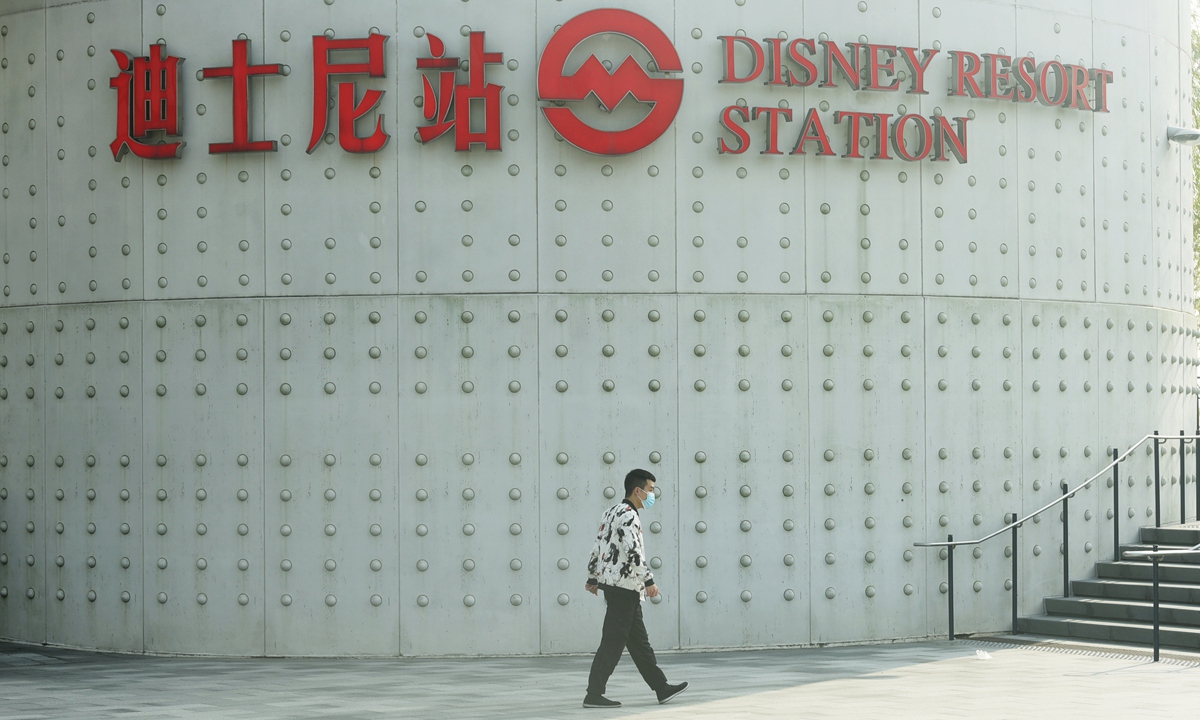Shanghai grabs headlines for swift, accurate COVID-19 response at Disney Resort, sets model for 'China speed'

A person walks by the Disney Resort station on November 1, 2021. Photo: IC
Shanghai Disney Resort again hit the headlines on Monday morning across China, not for its thrilling Halloween activities or shows and parades, but Shanghai's remarkable emergency epidemic response in the face of a sudden COVID-19 screening request. The city's swift reaction leads the "China speed" in response to COVID-19 risks when many parts of the world are still struggling with epidemic surges.
In a few hours, more than 33,000 people inside the park had completed nucleic acid testing; after merely one night, all the results came out negative. Latest data showed results of nucleic acid tests on more than 66,000 people related to #DisneyResort in #Shanghai came back negative.
Experts noted that this can be attributed to a mature, accurate anti-epidemic mechanism in China that enables the country to dynamically track and curb the disease and meanwhile ensure that people's normal lives and work are not disturbed.
Shanghai Disney Resort was temporarily shut down on Sunday, after a report said one of the positive COVID-19 cases from neighboring Zhejiang Province in East China was found to have visited the park.
All 33,863 tourists and staff inside the park were asked to take nucleic acid tests before they could leave.
"At first, we couldn't believe that immediate COVID-19 testing was possible as there was such a big crowd inside Disneyland," a visitor said, sharing his story, "but when people started to line up in front of the testing points, quiet, calm and orderly, we realized that we can trust the city's management capability."
Test results of the 33,863 people on Monday morning showed all of them were negative. Results of some 920 samples taken from the park's environment were also negative. The park had also been disinfected, according to a notice from the Shanghai epidemic control and prevention leading group.
The video of medical workers' taking people's throat samples for COVID-19 screening against the backdrop of the splendid fireworks in Disneyland touched millions of netizens' hearts.
"This year's Halloween has no ghosts and gods, no galaxy-saving Superman; an orderly city organization is our golden shield," one netizen said.
A Global Times reporter noticed on site that no visitors were allowed to enter Shanghai Disneyland or Disneytown on Monday. Security guards at the entrance were seen checking the health codes of staff members. At the entrance, a staffer surnamed Yang told the Global Times that he had entered the park to take nucleic acid tests for a second time.
The Disney Resort station had already reopened on Monday following a one-day shutdown. However, few passengers were seen in the station, a stark contrast with normal, busy days. The coffee shops and convenience stores were all closed at the station.
Wang Guangfa, a respiratory disease expert at Peking University First Hospital, told the Global Times on Monday that Shanghai's method of coping with the emergency reflected China's establishment of a system to detect, control and contain risk groups for COVID-19 from further spreading the infection in a more cost-efficient way.
The country starts from epidemiological surveys to quarantining close contacts, and then to carrying out large-scale tests for targeted groups. "The key lies in detecting the sources of infection and their movements," Wang stressed.
Analysts suggested that the proactive and efficient resolution of emergencies is also a result of years of accumulation of digitalized city governance experiences in China.
A recently rolled out city operations management center in Shanghai, which is regarded as an "epoch-making reform," has made a thorough organizational innovation that draws a clear line of vertical command and management for emergency response departments at all levels, guancha.cn reported.
By establishing a management network that integrates the city's emergency response, public security, first aid, traffic and other public services, the preparation, execution and evaluation for an emergency response has been greatly improved.
In some places, however, there are still "one-size-fits-all" methods regarding epidemic response, as local authorities would seal off a city after sporadic cases are found. Wang noted that such measures are often seen in places where the source of infection has not been identified. When the target is not clear, the most secure choice is to impose strict prevention measures, he added.
Yanshan county in East China's Jiangxi Province closed a holiday resort and limited traffic after one positive COVID-19 case was reported on Sunday, breaking a 610-day record of no new local cases in the province. The county at one point said that all traffic lights would be switched to red to discourage driving, which triggered heated discussion on the internet, but the policy was soon revoked on Sunday, according to media reports.
The city of Ruili in Southwest China's Yunnan Province, which shares a long border with Myanmar and has been under tight COVID-19 controls due to pressure from imported cases, has also eased its policy on leaving the city in the face of mounting public concerns over people's livelihoods.
Responding to such concerns, the city government announced plans to streamline departure procedures and provide more quarantine hotels to meet people's needs, while offering subsidies and fee reductions for residents with difficulties.
As voices from Western media seeking to discredit the nation's zero-tolerance policy are rising, Wang said that China's approach has proved to be far more responsible, effective and cost-efficient when seen as the big picture.
"By sacrificing individual regions for a short time, China has been able to keep most of its areas free from the negative impact of the epidemic," he said.
"It is a stark contrast to the situations in many Western countries where epidemics have swept across the whole country. They have to take a laissez-faire approach as they do not have the capacity to operate such a policy, which requires the united resources of all. Only China can do this, which has proved to be a success," Wang said.


